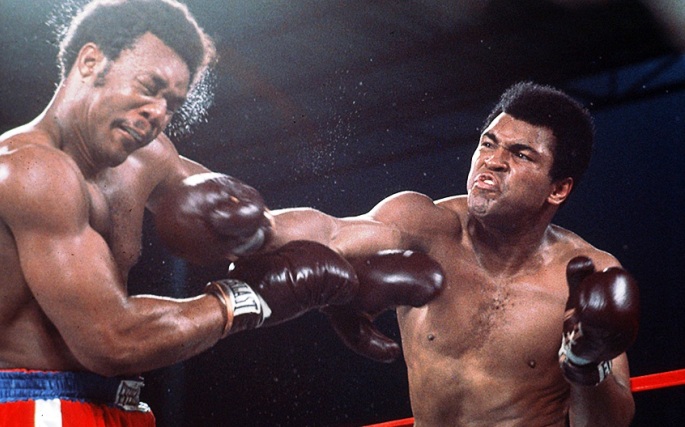Fifty years later: the impact of Ali vs. Foreman
3 min read
George Foreman, left, and Muhammad Ali at Stade du 20 Mai. Photograph: ABC Photo Archives/Disney General Entertainment Content/Getty Images

George Foreman, left, and Muhammad Ali at Stade du 20 Mai. Photograph: ABC Photo Archives/Disney General Entertainment Content/Getty Images
Fifty years after the legendary bout known as the “Rumble in the Jungle,” the historic clash between Muhammad Ali and George Foreman continues to resonate deeply within the hearts of the Congolese people. This iconic fight took place in Kinshasa, then known as Zaire, and ended with a surprising victory for Ali, who reclaimed the world heavyweight title through a knockout, solidifying the match’s place in boxing history.
The significance of this event transcended sports; it left an indelible mark on boxing in Congo, inspiring generations of athletes and fans alike. As the anniversary of this momentous fight approaches, boxers from across Africa have gathered in Kinshasa for the 21st African Amateur Boxing Championships, celebrating the sport that has brought pride and recognition to the nation.
One participant, Landry Matete Kankonde, affectionately known as “Balo,” represented Congo in the heavyweight division. He believes that the global spotlight cast on Congolese boxing can largely be attributed to the “Rumble in the Jungle.” “It’s a way to celebrate,” he remarked, reflecting on the championships’ connection to the historic fight. Despite facing defeat against Senegal’s Karamba Kebe in the finals, Kankonde remains optimistic about the future of boxing in his country.
“Boxing holds a unique significance in Congolese culture,” Kankonde expressed. He highlighted how the determination of Congolese boxers serves as a source of inspiration for their compatriots. “Whenever a Congolese boxer gives their all, it inspires us, considering all we endure here,” he said, expressing his hope to emerge as a prominent figure in the sport within the next few years.
Alfred Mamba, who was just 15 during the original bout, recalls the event as a joyous occasion that united people. His father, Gabriel Mamba, was a referee and played a crucial role in organizing the fight after meeting promoter Don King at the 1974 World Amateur Boxing Championships in Havana, Cuba. Mamba vividly remembers attending the match, which was scheduled for 4 a.m. local time to accommodate American audiences.
“After the fight, everyone wanted to learn boxing,” Mamba recalled, emphasizing the excitement that the match generated. He described Ali’s victory as unexpected, crediting it to the champion’s strategic rope-a-dope technique, where he absorbed Foreman’s powerful punches while leaning against the ropes, ultimately tiring the formidable opponent.
Mamba takes pride in the lasting legacy of the fight, yet he voices concerns about the lack of support for local boxing. He pointed out that despite the fame brought by the bout, the Congolese boxing federation did not capitalize on the opportunity. Many boxers in the country struggle with inadequate training facilities and often have to train outdoors.
“However, when we compete abroad, we return with medals,” he noted, illustrating the resilience and talent of Congolese athletes. The challenges they face only add to their determination and spirit in the ring, showing that the legacy of Ali and Foreman lives on in the new generation of boxers.
The “Rumble in the Jungle” not only showcased the incredible skills of Ali but also highlighted the rich cultural significance of boxing in Congo. The fight brought the world’s attention to the country and ignited a passion for the sport among its people. As the boxing championships unfold, the echoes of that historic night in 1974 continue to inspire and motivate, proving that the impact of Ali vs. Foreman will resonate for generations to come.
In reflecting on the past, the Congolese boxing community celebrates its history while looking forward to a future filled with hope, ambition, and the promise of greatness in the ring. The spirit of that unforgettable bout remains alive, driving the next wave of boxers to achieve their dreams.